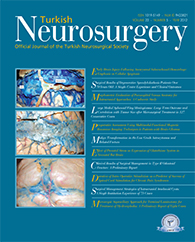2Dokuz Eylul University, Faculty of Medicine, Department of Physiology, Izmir, Turkey
3Dokuz Eylul University, Faculty of Medicine, Department of Child and Adolescent Psychiatry, Izmir, Turkey
4Dokuz Eylul University, Faculty of Medicine, Department of Biochemistry, Izmir, Turkey
5Dokuz Eylul University, Faculty of Medicine, Department of Pediatrics,, Izmir, Turkey
6Dokuz Eylul University, Faculty of Medicine, Department of Neurosurgery, Izmir, Turkey DOI : 10.5137/1019-5149.JTN.5633-11.1 AIM: Traumatic brain injury (TBI) may cause neuropsychiatric disorders such as anxiety disorder which has negative effects on cognitive functions and behavior. The aim of this study is to investigate the effects of TBI on anxiety and vascular endothelial growth factor (VEGF) immunoreactivity on the prefrontal cortex of immature rats, which is one of the anxiety-related regions of the brain in 7-day-old immature rats subjected to contusion injury.
MATERIAL and METHODS: Rats were divided into three groups: Control (n=7), Sham (n=7) and TBI (n=7). Anxiety levels were assessed with open field activity and elevated plus maze in postnatal 27 days. Prefrontal cortex damage related to TBI was examined by cresyl violet staining and VEGF immunostaining. Prefrontal cortex neuronal density was calculated. Serum corticosterone levels were determined.
RESULTS: The anxiety level in the TBI group was significantly greater than the control and sham groups. The prefrontal cortex VEGF immunostaining score and neuron density were decreased in the TBI group compared to control and sham group. Serum corticosterone levels were significantly increased in the TBI group.
CONCLUSION: These results indicate that TBI decreases VEGF immunoreactivity in prefrontal cortex neurons and increases the anxiety levels of immature rats.
Keywords : Traumatic brain injury, Immature rat, Anxiety, VEGF, Prefrontal cortex




